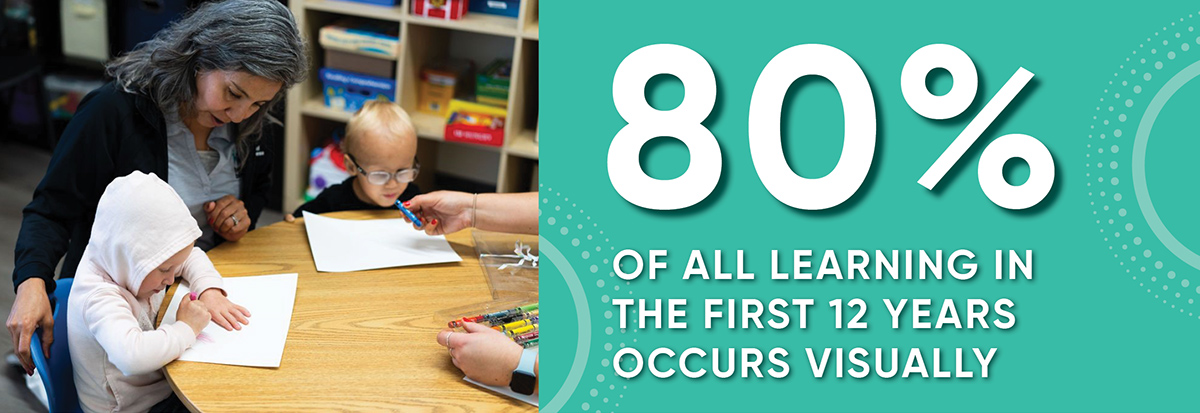Regular eye exams beginning in the newborn period can play a pivotal role in putting children on a path to reaching their fullest potential.
Early detection of visual impairment is not only necessary for medical interventions — it’s a critical part of creating the best possible chance for infants and toddlers to thrive.
For kids like Owen, it can change the trajectory of their lives. When he was born, Owen had signs of coloboma in both eyes, which is an area of missing tissue that gives the pupil a keyhole shape. But despite early indications, the right tests were not done immediately.
His family brought him to Beyond Blindness at four months old, where he received a comprehensive vision exam in our Low Vision Clinic. With the support of our Early Intervention team, he’s since reached key milestones in his development. He’s walking, learning to navigate steps, and even riding a bike.

According to the Academy of Ophthalmology, 80 percent of all learning during the first 12 years of childhood occurs visually. This puts children with visual impairments at a significant disadvantage and at risk for delays in all developmental domains.
Early detection is vital, and not just for children like Owen who show outward-facing symptoms of vision problems. Some conditions, such as a lazy eye (amblyopia), may have no warning signs at all, and young children may not report having any issues with their vision.
Vision problems affect 1 in 20 preschoolers and 1 in 4 school-aged children — yet, fewer than 15 percent of preschoolers have ever had an exam. Even when students receive exams at school, those screenings can miss 75 percent of vision problems.

More than ever, there is a clear and urgent need to focus on early intervention.
This spring, a landmark bill was introduced in the U.S. House of Representatives that will help communities implement strategies for early detection of visual concerns. Called the Early Detection of Vision Impairments in Children (EDVI) Act, the bipartisan bill will establish grants for states to improve pediatric vision and eye health through a coordinated system of care. The goal is to ensure every child with a possible vision problem is identified and connected to resources that will help them overcome any obstacles and delays.
If passed, this will be the first federally funded program to address vision and equitable eye care for children. In the 96 percent of U.S. counties that lack access to pediatric ophthalmologists and optometrists, the EDVI Act will be transformational. It will mean families in neighborhoods with lower socioeconomic status — who experience challenges like a lack of transportation or insurance, immigration status, and language barriers — will be able to access vital screenings and appropriate care without unnecessary delays.
As a leader in early intervention for Orange County children with visual impairments and other disabilities, Beyond Blindness believes this is an important step forward in delivering quality care to every family in need. It will not only provide more opportunities for early detection of vision concerns, but also reduce disparities in eye health and remove barriers to care that will put infants and toddlers on the path to achieving their fullest potential.

The American Optometric Association recommends that children have their first eye exam at 6 months old, another at age 3, and then at the start of each school year.
To avoid lifelong visual impairments, Beyond Blindness is strongly committed to the early identification of eye disorders and diseases. In doing so, children may be able to receive treatment before further vision loss or learn to adapt using low vision aids, Braille, and assistive technology.
Our unwavering commitment to early detection continues at our Low Vision Clinic, where we provide free weekly vision screenings and examinations. To schedule a free vision exam at Beyond Blindness, please contact us at (714) 573-8888 or email info@beyondblindness.org.
Early detection is the most effective strategy we have to empower our children to lead fulfilling and rewarding lives, schedule a vision exam today!
